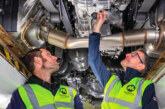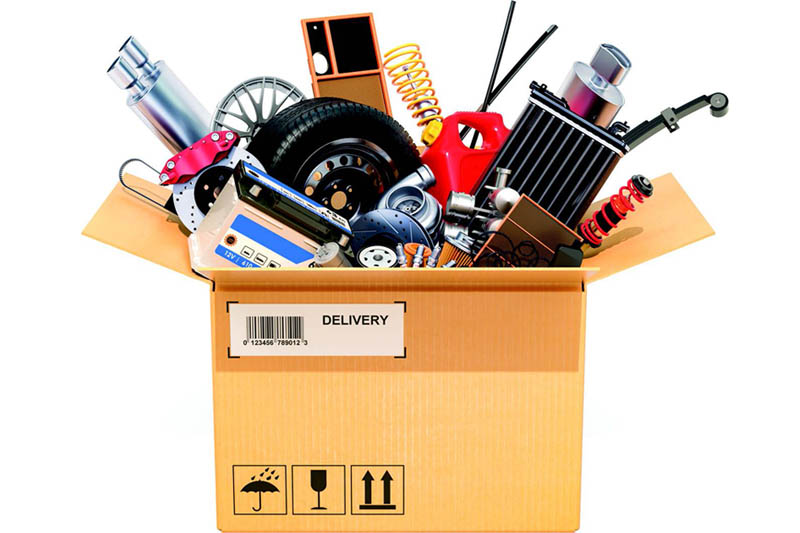
To say Brexit introduced uncertainty would be an understatement, but its impact on parts supply is still being processed. Coronavirus has also not helped companies adjust to the changes, so Cian Brittle explores the impact of both and what operators need to be aware of moving forwards.
This month will mark five years since that momentous day of the EU referendum, yet questions lingered on what form of Brexit we would be experiencing right up until 11pm on 31st December 2020. A ‘hard’ Brexit was the feared outcome (the UK operating outside the EU’s single market and customs union, trading on the basis of a free trade agreement), and this would have had a catastrophic impact on the short-term future of parts supply in the UK.
Luckily, this is not what transpired, as an agreement was reached at the eleventh hour, literally. Companies across the commercial vehicle industry still had to prepare, however. It was certainly not business as usual, especially for those who imported from the EU and now had additional hurdles to overcome.
What has been done to ensure the impact is minimal during this transition? Back in February, the Government introduced a £20 million SME Brexit Support Fund to allow small- and medium-sized businesses (SMEs) to adjust to new customs, rules of origin, and VAT rules when trading with the EU. However, this only affects the smaller operators for obvious reasons. We are yet to see the full effect on the big parts manufacturers, as the UK has granted importers a six-month grace period in order to give them time to get prepared.
This six-month grace period comes to a close at the end of this month, so discussing the true impact of Brexit on parts supply is mere conjecture at this point. However, we can certainly analyse the progress up to this point. At the moment, it’s safe to say that OEMs and distributors are doing their best to minimise the full impact. However, if there is a parts shortage or costs rise for importing, then this will certainly impact on overall workshop costs and vehicle downtime.
So, operators must be aware of this risk of a price rise as we move later into the year, and that certain repairs may take longer if parts are not available in the UK. However, it’s safe to assume parts that routinely wear, such as brake pads and discs, will be relatively unaffected. This may mean that more expensive items will be harder to source, with next-day deliveries becoming harder to accommodate on parts such as larger transmission items. Could these supply issues prompt some operators to change buying policies?
My advice to operators would be to not put all of your eggs in one basket, as this could certainly prompt a rethink in OE purchasing decisions. As long as you don’t assume that parts supply and prices will remain the same, you can prepare yourself as best as possible for any future fluctuations. It’s also important to remember that manufacturers may still be adjusting their production output post- COVID after the short working weeks of last year.
Crucially, the picture is still unclear as to how things will be truly affected, and this is made no more evident than by some companies we contacted electing to abstain from this feature due to the delicate situation surrounding Brexit. In light of this, CVW examines how a handful of companies have gone about preparing themselves for the impact of Brexit, how this has been affected by Coronavirus, and what conclusions we can reach in the face of the future.
Fail to prepare, prepare to fail
In order to understand where we’re at now, it’s important to look back at how companies initially braced for Brexit. On the whole, delays were expected across the board, but there were contrasting realities for some companies. The key for all of them, however, was plenty of forward planning.
“We expected delays, which is why part of our preparations included increasing minimum stock levels on a number of SKUs,” explains Paul Dodgson, Operations Director at febi. “We also made sure that our logistics partners had the expertise and capacity to handle the additional administration. [Therefore], we successfully experienced no loss of availability due to Brexit.”
A similar sentiment is shared by Darren Miller, Business Development Manager at Sampa UK &Ireland. He adds: “Our plan for parts supply around Brexit was put in place many months before the actual changeover date. As a manufacturer, we were able to quickly increase our order from our manufacturing base in Turkey and inject more containers to ensure we had extra deliveries before the Brexit deadline, whilst also maintaining deliveries post-Brexit. Fortunately, we did not see too many delays and the shipments that were caught up in the initial port issues were covered from our extra deliveries we had received pre-Brexit.”
Planning ahead was obviously the main consideration for companies wanting to soften the blow of Brexit as much as possible. Further evidence of this is provided by Damian Milling, National Sales Manager – Aftermarket at Mann+Hummel: “We actively planned for the worst case situation with Brexit, but hoped that we would not have to action all of our plans. We invested heavily in AEO accreditation [this demonstrates that a company’s role within the international supply chain is secure and that its customs controls and procedures are efficient and compliant], increased stock holding, engaged with a specialist import and export provider, and actively encouraged customers to also make preparations of their own.”
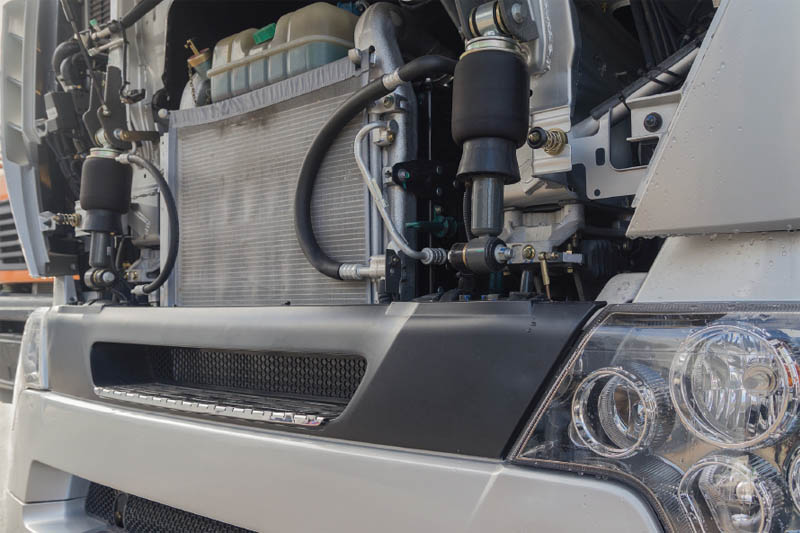
However, Darren Miller points out that the lack of delays seen is largely down to the manufacturers working extremely hard to minimise disruption as much as possible, as evidenced by the company’s work in Ireland. He explains: “We have worked with our service providers to ensure we minimised any disruption to parts supply to our clients based in Ireland. It is fair to say nobody was immune to the issues faced at the ports; however, we continued to work closely with our carriers to ensure we supported their needs in clearing the goods as swiftly as possible. Thankfully, everything has settled down and our shipments to Ireland are now back to normal.”
Ken Clark, Managing Director of Rotronics, is another who warns of the delays that companies are now facing, even in the face of advanced preparation. He says: “We expected delays in supply, increased shipping costs, and cost prices. Cost prices have not gone up, but we have seen delays in supply and shipping costs have risen. We prepared by bulk ordering stock to ensure that we had continuity of supply of spares and products. We made sure that we had three months’ worth of supply. We also communicated with our customers well in advance to build forward orders to mitigate issues with supply.”
So, although the impact was not nearly as bad as first feared, it’s important for us to remain vigilant in the face of fluctuations and inconsistencies to parts supply. A ZF Aftermarket spokesperson describes how the company is keeping abreast of any potential disruptions. They outline: “Since 2018, we have been preparing in various task forces and working groups on a no-deal scenario, including an interdisciplinary task force. Even after Brexit with free trade agreements, this task force is still active in order to be able to react quickly if necessary and to keep the supply chain stable.”
The here and now
Whilst delays were expected and for the most part managed, it’s important to remember to be wary of a potentially volatile market. After all, on top of delays caused by the increase in red tape between the UK and EU, there have also been availability issues that have arisen for parts, due to worldwide shortages as a result of COVID-19.
Ken Clark outlines: “We have experienced shortages. Some delays relate to product coming in from China. Some suppliers have at least 12-week delays and we can see that lead times have doubled from some suppliers.” This is echoed by James Daykin, Group Aftermarket Manager at RH Commercial Vehicles (RHCV), who says: “Any [parts] shortages are more as a direct result of the challenges of COVID-19 rather than Brexit.”
Paul Dodgson also confirms: “On certain lines we have experienced some availability issues, however, the reason behind this is better attributed to the global pandemic rather than Brexit.” So, COVID-19 has severely impacted the output of parts manufacturers, something which is not helped by delays resulting from red tape.
“Initially, there were delays for deliveries to certain countries due to Brexit red tape,” comments Damian Milling. “We worked hard with all parties concerned to resolve these in as timely a manner as possible.” Therefore, it’s clear that both the global pandemic and Brexit are having an unquantifiable impact on parts supply, and it’s difficult to tell which is having the greater impact at this moment.
Ken Clark explains: “We have experienced delays in obtaining parts. This is related to Brexit, but COVID-19 is masking some of the issues right now and it is difficult to differentiate between COVID- 19 and Brexit as the cause of the issues.” This is backed up by Paul Dodgson, who says: “Both Brexit and the global pandemic have played a part in increasing lead times throughout our supply chain.”
Knock-on effects
In light of both delays to parts manufacturing and parts delivery, have there been unexpected price increases as a result? At the moment, it looks as though prices are holding firm, helped by manufacturers doing their best to absorb any fluctuations in cost. Darren Miller of Sampa outlines exactly what the company has done to aid its customers. He explains: “We know the market has experienced price increases already this year and some aftermarket suppliers have increased prices twice already. So far we are maintaining our current pricing and we feel this is important to support our customers as we continue to ease ourselves out of the lockdown and get back to some level of normality.”
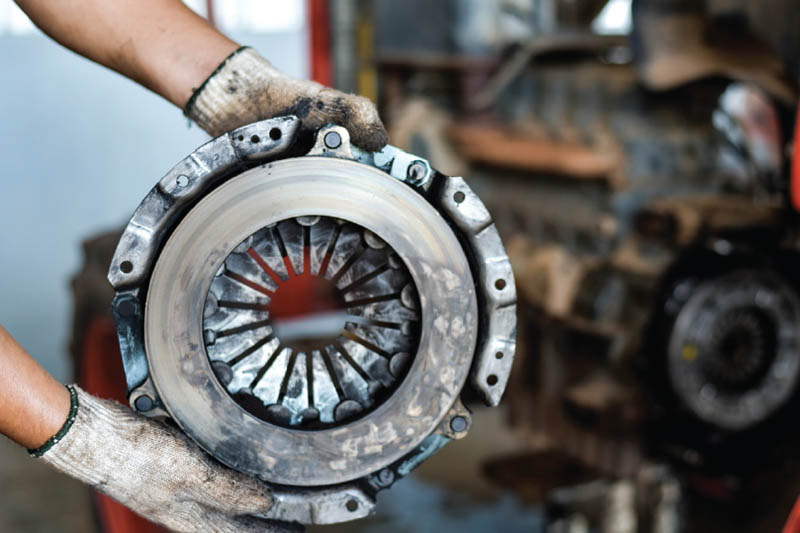
Damian Milling offers a similar explanation, as he says: “As a responsible supplier, we endeavour to constantly look for efficiencies and cost control processes to allow us to reduce cost price impact wherever possible.” Ken Clark expands on this point, as he states: “We have not experienced product price increases because we have such strong relationships with our suppliers; but the tariffs and delivery charges have been additional cost elements.”
However, there is caution offered by Paul Dodgson of febi. He warns: “The global pandemic has resulted in large demand fluctuations which has led to a shortage of key raw materials globally, and this has led to cost-push increases in the cost of goods. Furthermore, global shipping costs remain extremely high, which is a further challenge in relation to the overall cost of supply. Sooner or later, these increased costs for all suppliers will need to be passed on to the workshops and vehicle operators.”
The issues surrounding delays and the potential for a future increase in price means workshops are bound to be affected. Darren Miller agrees: “Undoubtedly, vehicle downtime could be impacted through parts availability, but we try wherever possible to help our customers supplying the workshops to maintain a high level of parts supply.”
This is emphasised from the workshop side, as James Daykin of RHCV confirms: “Yes, [vehicle downtime will increase in workshops], but we continue to work hard to minimise disruptions to keep vehicles on the road.”
Although, there is hope offered by both Paul Dodgson of febi and Ken Clark of Rotronics. The former states: “I would say [an increase in vehicle downtime in workshops] is unlikely as there are so many offerings in the market. Is there a scenario that the workshop does not get their brand of choice? Yes, certainly. May they have to pay more? Probably.”
The latter concludes: “We do not think that this will increase vehicle downtime because of our forward planning to mitigate delays. We believe that we have put the right processes in place. We do not believe that this has impacted our customers, but it has put pressure on businesses like ourselves.”
Landing on a singular conclusion is understandably difficult, with conflicting answers on display here. One thing that this should show is that there is still room for things to change, and the picture certainly remains unclear.
Moving forwards
Whilst the lasting effects of Brexit are yet to be truly seen, it’s beneficial to look at how manufacturers reacted with changes to their parts procurement policies, and whether or not there are continued plans to increase parts stock in the UK to help ease any future pressure on the industry.
Unsurprisingly, many companies fared differently when it came to how Brexit affected them on this subject. For those based in Europe, it seems to have been minimal at best so far. This is confirmed by Paul Dodgson of febi, which is based in Germany. He says: “Brexit has not yet had a material impact on our overall procurement policy.”
Darren Miller of Sampa, who are based in Turkey, supports this further. He explains: “For us, Brexit was a minor problem because, as a manufacturer, we can increase production quickly and our daily meetings with our colleagues in Turkey ensure we can minimise disruption.”
However, British-based Rotronics offers a different view. Ken Clark outlines: “Brexit has changed our parts procurement policy. We have increased our core stocking levels and place larger orders now, to try to reduce shipping cost and minimise downtime due to shipping delays. Prior to Brexit, we would order weekly, whereas now we order monthly or fortnightly and increase our stock levels.”
Despite the difference in experience either side of the Channel, one thing that can be agreed on by all is that increasing parts stock in the UK is of crucial importance. This should hopefully give confidence to operators and workshops alike that any difficulties with parts shortages and delays should be mitigated as much as possible.
Paul Dodgson confirms that febi has ensured its UK operations are as prepared as they can be. He explains: “In order to maintain high availability, we are increased overall stock levels. We are also widening our product range by at least 100 articles every month to position ourselves as a onestop- shop to our customers.”
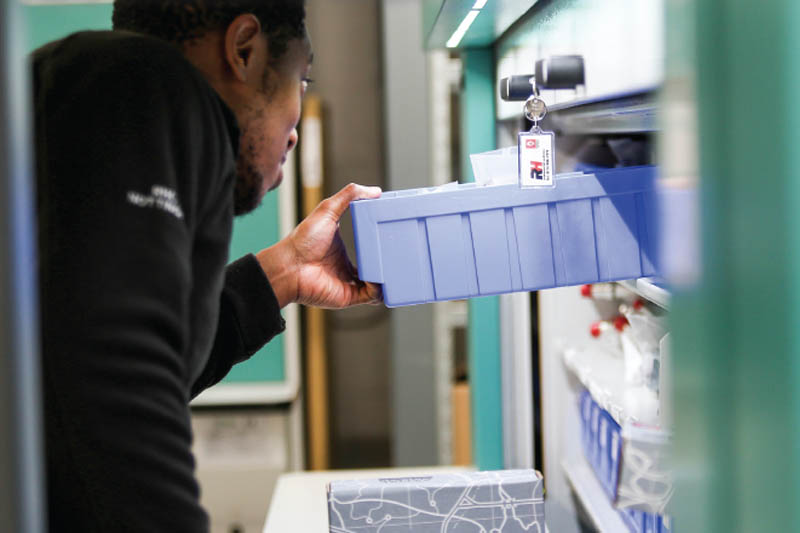
Darren Miller has the same to say from Sampa’s side, as he outlines: “We continue to stock our warehouse in Manchester with new shipments arriving each week. We are, of course, adjusting our existing stock levels to meet the increase in demand and monitor these closely to ensure our future parts supply remains optimum to our customers.”
From the British side, Ken Clark explains how Rotronics is carrying out a similar process; however, ensuring consistency of supply will be something that continues to provide difficulty moving forwards. He states: “We have increased parts stock in the UK, and Brexit has meant that our suppliers have to build a solid supply chain in the UK in a way that they did not have to before. We have had to ensure increased stock levels. Stock coming into the UK is problematic and we do not have the consistency and surety of supply that we used to have. So, building up these solid supply chains is critical – and difficult. Especially as all activities are currently being masked by COVID-19.”
Overall, it’s clear the negative effects have been managed thus far, but it’s also been difficult to differentiate between which problems have been caused by Brexit, or whether the pandemic has masked the true scale of the issues. Remaining vigilant will be the name of the game for operators and workshops, and paying close attention to price fluctuations and the terms and conditions will take on greater importance. CVW will continue to pay close attention as the situation develops to ensure our readers are kept informed and up-to-date on this delicate subject.




